*This page may include affiliate links, which means that if you make a purchase through one of the product links, we may receive a small commission. For full affiliate disclosure please see our disclaimer page.
Can dogs eat blueberries? Well, I hope so because I accidentally dropped a whole tray of them on my kitchen floor when I was putting away the groceries. When my dogs heard the sound it turned into a free for all that looked like a game of hungry hungry hippos!

Luckily, the answer is YES – dogs can eat blueberries. They are perfectly safe for dogs and they are actually good for your pup.
As a holistic veterinarian, I get questions like this a lot. Since blueberries are easy to buy and easy to feed – I am going to go over a few quick tips on how to feed these delicious berries. I will also highlight a few health benefits that your dog may get when you feed them blueberries.
Blueberries Are Safe For Your Dog
So now that we have established that blueberries are safe for your dog to eat, let’s go over how much to feed, how often, safe sourcing, preparation, and facts about calories.
What Kinds of Blueberries Can Dogs Eat?
Dogs can eat all kinds of blueberries! Highbush varieties are plump and sweet. The lowbush variety is also frequently called “wild” blueberries and they tend to be a little bit more tart. I tell my clients that any type of blueberry that you find in a grocery store or farmers’ market is safe for your dog to eat. I usually tell pet parents to stay away from any truly “wild” blueberries like out in nature. Just because other types of plants have fruits that may look like blueberries but they can be toxic to both people and pets.
Blue colored berries on evergreen juniper bushes as well as dusty blue colored berries on red cedar trees have been used as herbal medicine by Native Americans. But both of these will most likely cause your dog to throw up. So stay away from blueberries in the wild, but you are safe with blueberries from a store.


Can Dogs Be Allergic to Blueberries?
Allergies or sensitivities can develop in reaction to any food, but it is not a common allergy. I personally have never seen a pet that was allergic to blueberries.
How Should You Prepare Blueberries for Dogs?
Fresh blueberries should always be rinsed with water to remove any pesticides or preservatives. Check for anything rotten or moldy and don’t feed those to your furry friend. Frozen blueberries are already washed and they are typically flash frozen quickly after harvest. Most nutrients and antioxidants are still available in products frozen for less than 6 months. But various times, temperatures and processing can sometimes affect the nutrient composition. Most of my clients give their dogs frozen blueberries because its so easy. Giving berries frozen is advantageous because they do not get mushy, and this also helps prevent any carpet stains from spit-out berries.
| WARNING : If blueberries are fresh or if a frozen berry is thawed there is a risk for staining on carpets, furniture and doggie hipster beards. |
Other forms of blueberries include dried, freeze-dried/dehydrated, and powdered. All of these are great forms to give to your dog. The dried or powdered varieties may contain slightly fewer nutrients.

How Many Calories are There in Blueberries?
One cup of blueberries contains 80 Calories, so this means that each blueberry is 1-2 Calories each.
How Many Blueberries Can a Dog Eat?
When you are first starting to introduce blueberries to your dog, start with 1 or 2 berries and gradually increase the amount over time. This will just get your dog used to the taste and prevent any soft stools from a rush of rich vitamins. Small dogs can eat 5-10 berries. Medium breed dogs can enjoy 10-15 yummy berries. Large dogs between 40 and 100 pounds can eat 15-20 berries per meal. And giant breed dogs over 100 lbs can nosh on 20-25 berries per meal.

Can I Give My Dog Blueberries Everyday?
Yes, you can give your dog blueberries every day and also in every meal if you want. These delicious berries are packed full of nutrition as you will see in the cool info below!
Nutrients In Blueberries For Your Dog
- Fiber
- Vitamin C
- Antioxidants
- Anthocyanins
- Manganese
| **An Important Note About Manganese : Veterinary Researchers have recently found correlations between manganese deficiency and strength of joint ligaments. Details reveal that nutrition may play a role in hundreds of diseases. However the latest focus show that we might be seeing a significant increase in tendon problems and ligament injuries, due to deficiencies of manganese. Manganese is just one of many vital nutrients that has been depleted in our country’s soils due to industrial farming practices. I have personally seen that adding foods and supplements with manganese included can help dogs heal from knee injuries. You can read more about the whole food supplements that I see the best results with pertaining to musculoskeletal issues. |
Benefits of Feeding Your Dog Blueberries
- Strong Immune System
- Improved Digestion
- Less Constipation
- Clearer Brain and Memory
- Fewer UTIs
- Strong Muscles and Bones

Health Conditions That I Recommend Adding Blueberries
- Arthritis
- Skin Conditions
- Itching / Allergies
- Vision Problems
- Athletic Recovery
- Urinary Tract Infections
- Detox
- Dementia
Homemade Dog Treat Recipes With Blueberries
I like to make frozen stuffed bones for my dogs using leftover raw marrow bones. Mix up a filling ( which changes based on what ingredients I have available and need to use up, and my dogs’ food sensitivities ) and fill the bones with the filling mixture and put them in the freezer for at least a few hours. Then they are ready for rewards, treats, or boredom busters if we have yucky weather.
One of my rescue Dachshund mixes, named Canon, loves any type of fruit in his frozen bones. His sister, Piper, likes blueberries – but not mixed with bananas.
Frozen Blueberry Banana Stuffed Bone Recipe
- 6 cups organic oatmeal
- 1-2 cans Wellness wet dog food
- 1 tbsp psyllium husk powder
- 1 cup frozen blueberries
- 2 bananas
Directions: I simply cook the oatmeal on the stove, dump it into a large stainless steel bowl and mix in my other ingredients. I usually use the Wellness beef wet dog food, its easy to use and doesn’t have a bunch of other icky ingredients in it. Keep the blueberries frozen for easier handling and I usually like to fold the bananas in as the last ingredient, they can be frozen too.
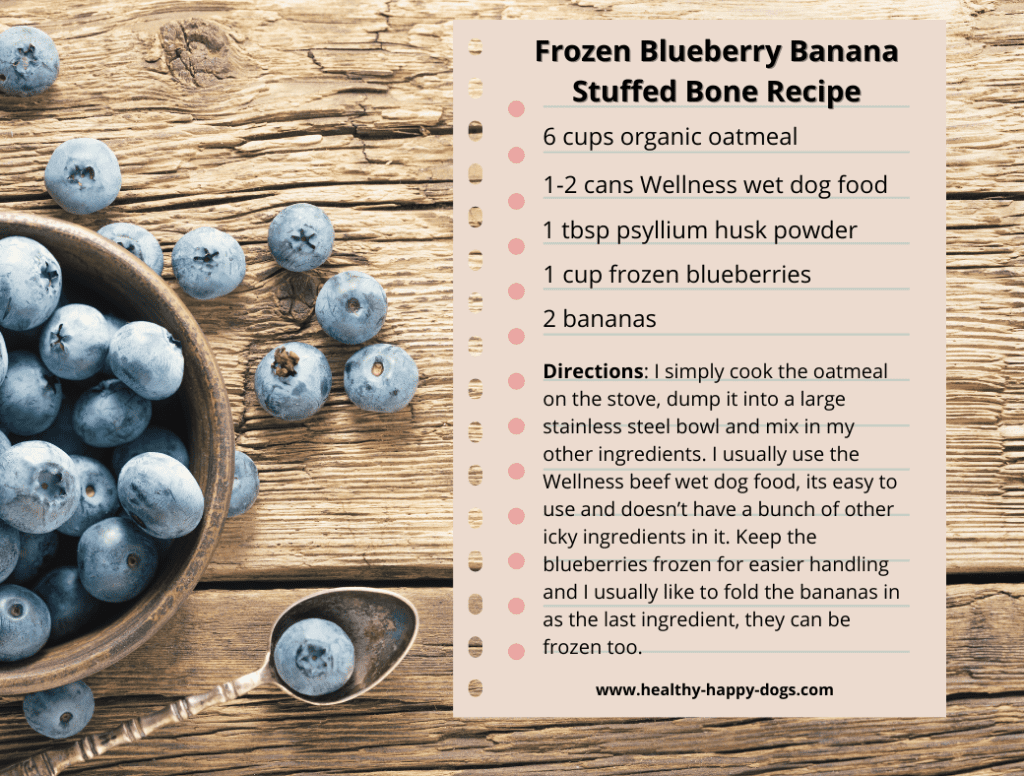
Baked Banana Blueberry Cookie Treats
Adapted from a recipe at Pookspantry.com
Ingredients :
- 6 cups old-fashioned oats
- 2 eggs
- 4 bananas
- 1 cup blueberries
- 1 tsp Himalayan salt
Directions :
Pulse your old-fashion oats in a food processor into a rough flour. Add blueberries, frozen or fresh into the food processor oats. Pulse lightly and pour into a large mixing bowl. Add 2 large eggs, 4 bananas, and 1 tsp of pink Himalayan salt.
Form into small biscuit forms about ½ in thick. Place on a baking sheet with parchment papers into a pre-heated oven. Bake at 350 degrees F for 15-18 minutes.
Allow to cool and store in a food storage container in the fridge for up to 2 weeks.
Your Dog Will Love These Treats
If you don’t have the time to make something homemade, here are a few of my favorite dog treats available to buy.
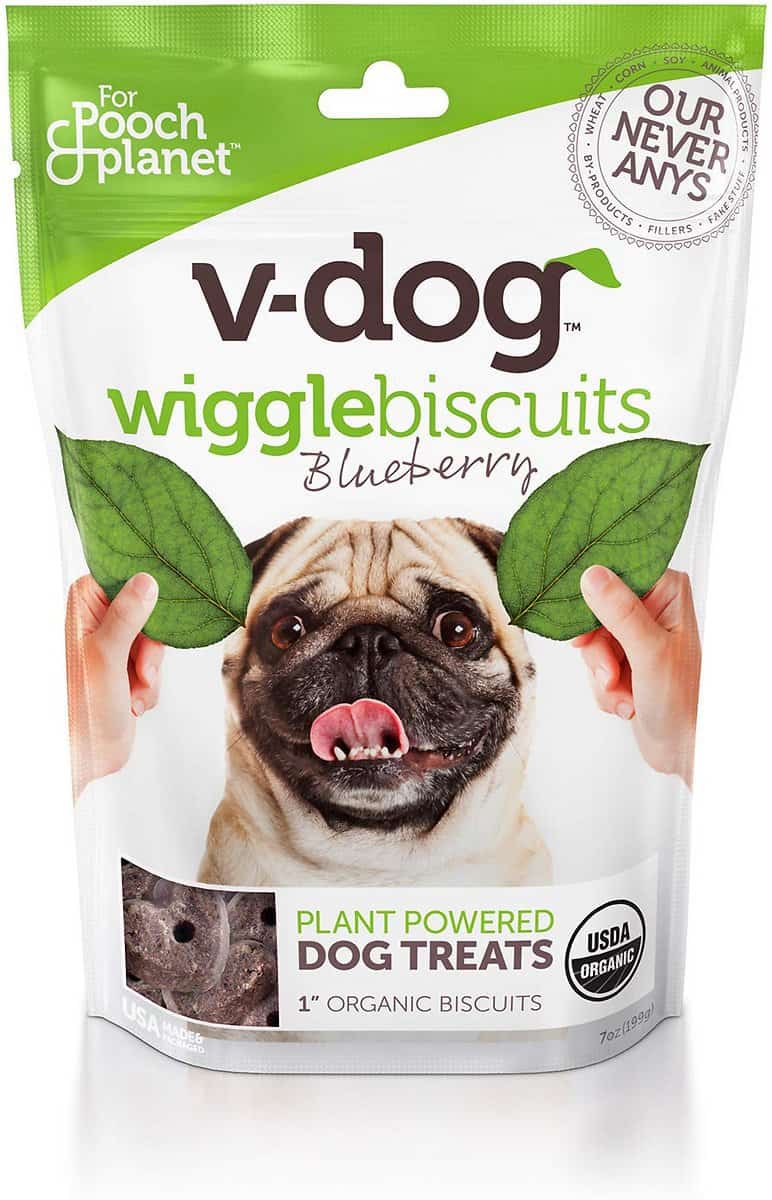
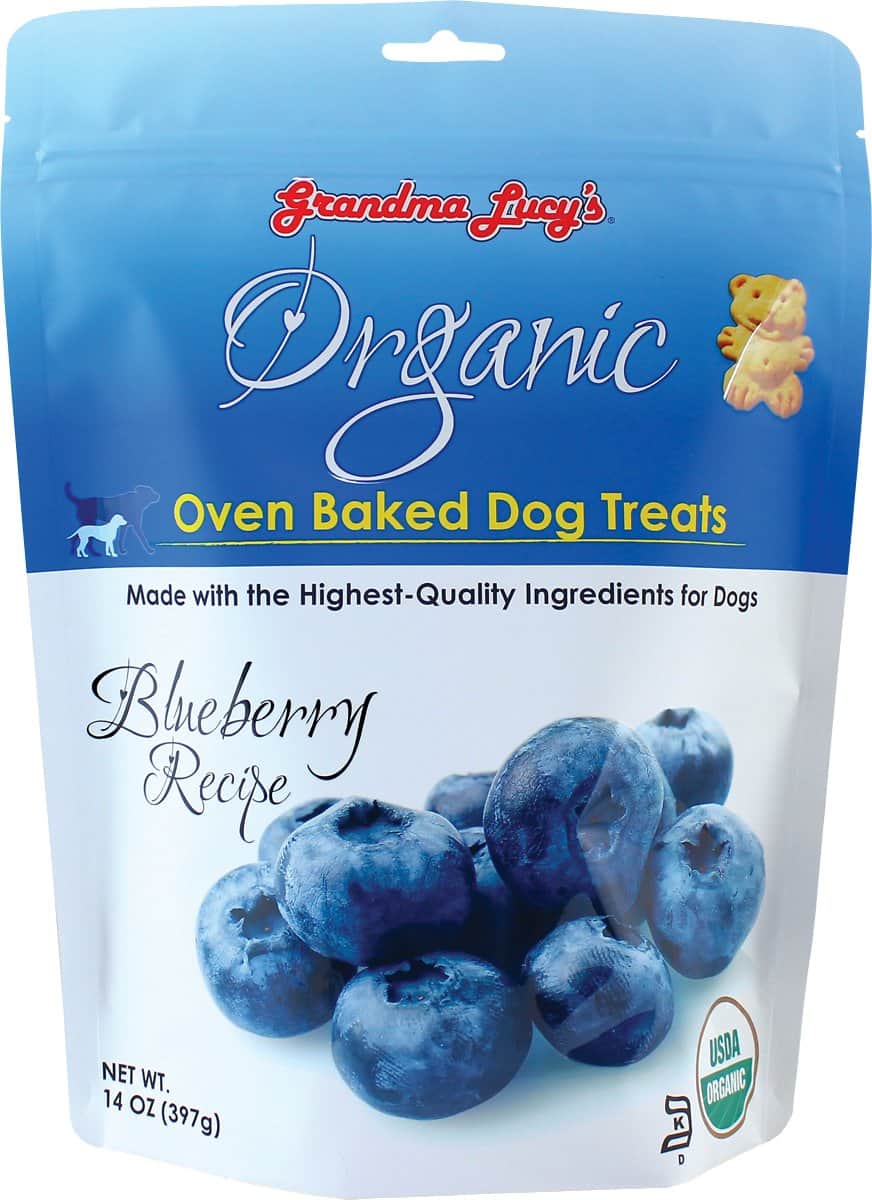
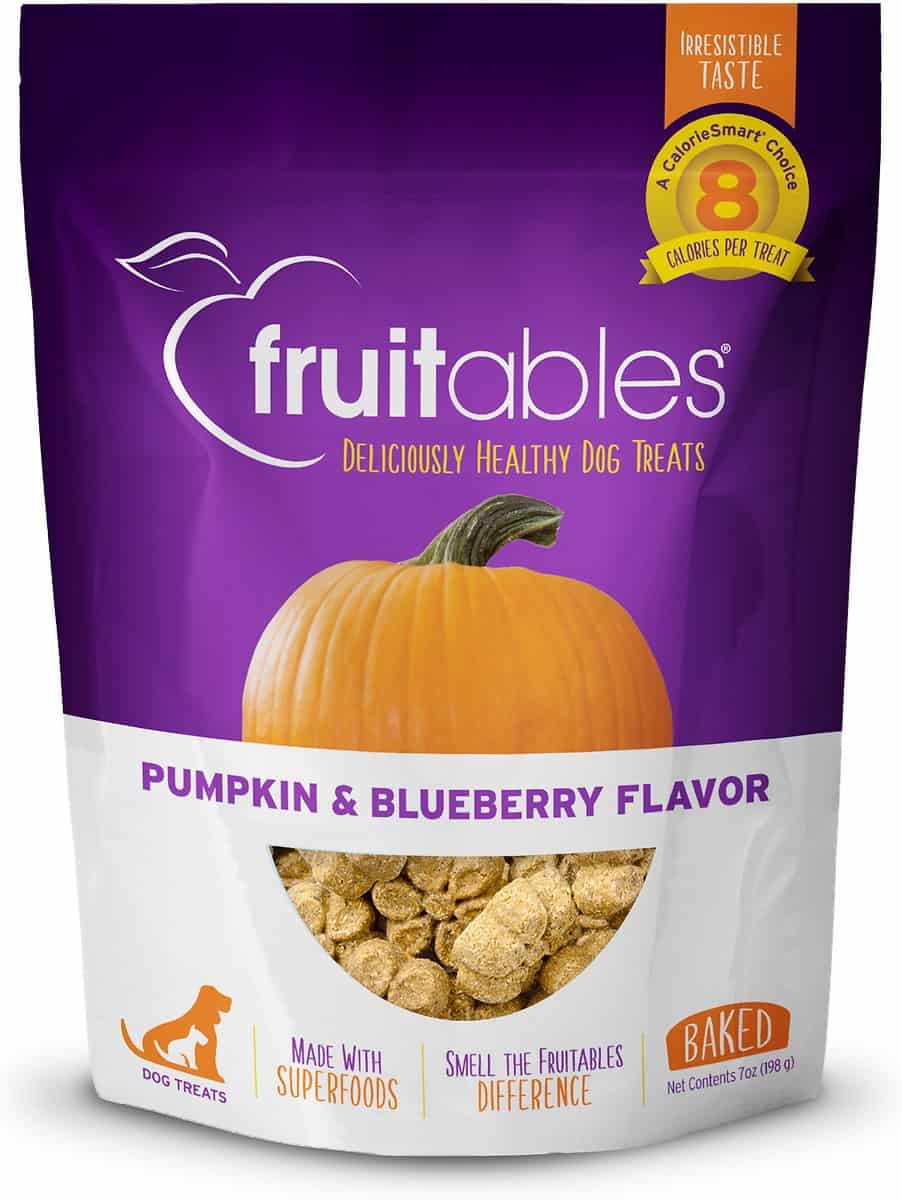
Are There Any Good Supplements Containing Blueberries For My Dog?
Since blueberries are so nutritious, they make great ingredients for supplements. Using supplements is a great way to include some of the health benefits of blueberries in an easy and powerful way.
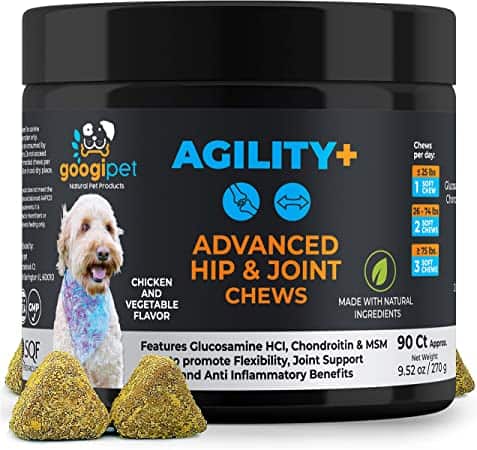
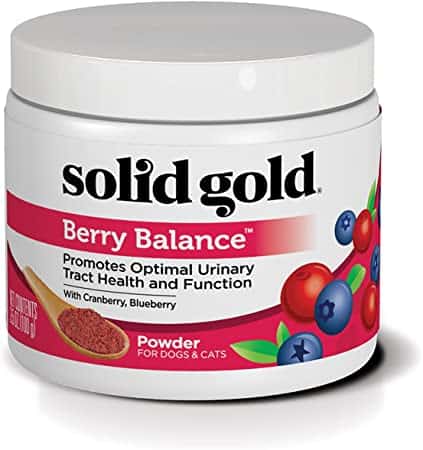
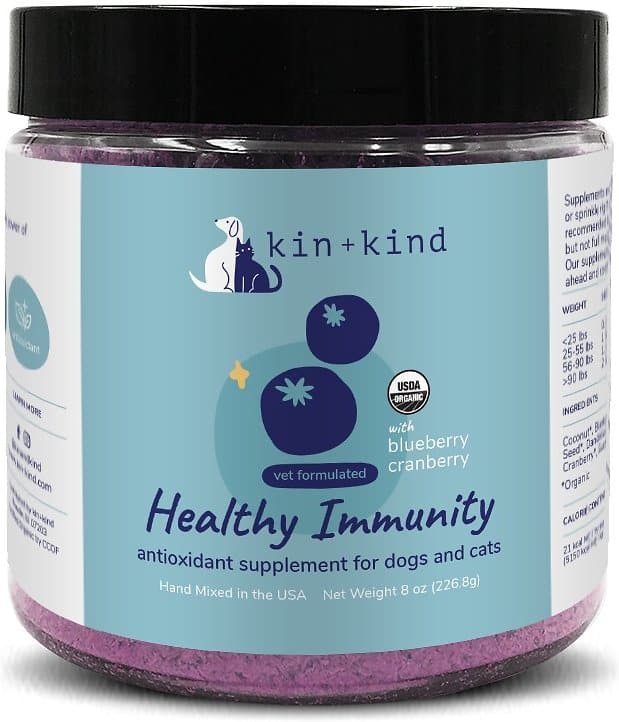
So, as you can see, there are many ways to add the health benefit of blueberries to your dog. Try adding a berry or two to a whole meal, or try giving them to your dog as a treat. Most dogs will scarf it up. Occasionally a dog or two has said ‘no thanks’. Adding some blueberries is just one step you can make towards a healthier and happier dog.
Check out our other articles for even more knowledge to keep your dog healthy and happy!
7 Beneficial Herbs For Dogs That You Can Grow In Your Garden
Rubber Mulch For A Dog Run? 9 Things You Need To Know
Let us know if your dog likes it on your favorite social media platform.
